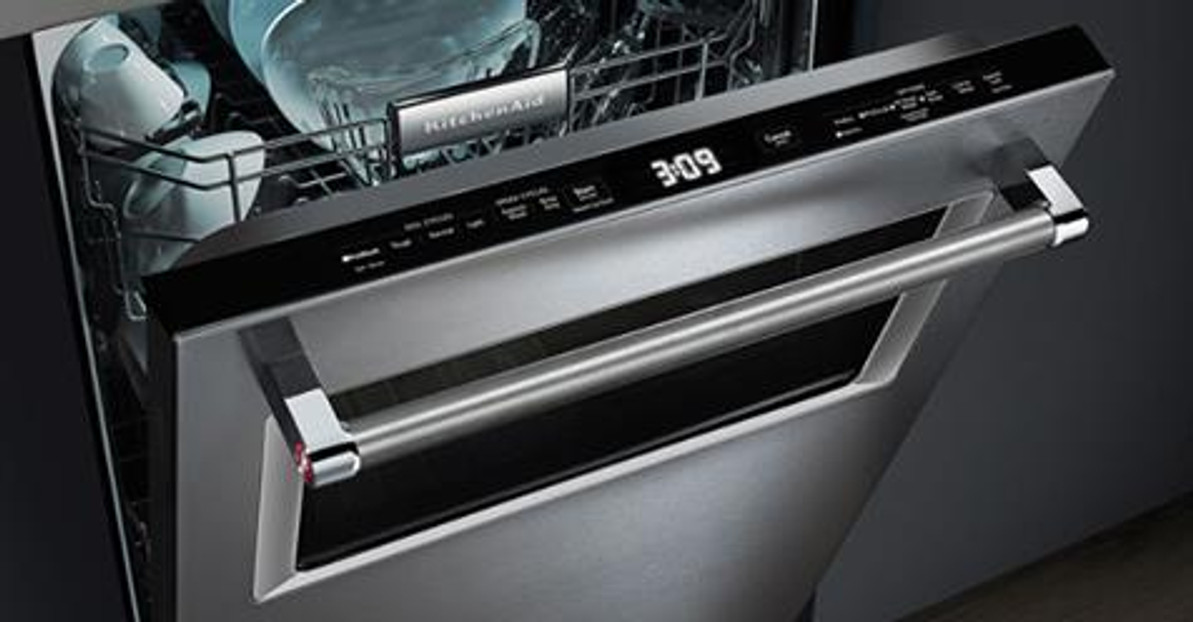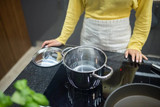25 Dishwasher Tips
25 Dishwasher Tips
Your dishwasher uses jet sprays of hot water to clean your dishes, and an electric heating element to dry them off. This article and video gives you 25 tips that will help you to reduce energy, improve performance, and extend the useful life of your dishwasher.
DISHWASHER OPERATING TIPS
1. Get the water in your sink running hot before starting your dishwasher
, especially in the winter, so that your dishwasher doesn't start running with cold water.
2. Run an empty load with a cup of vinegar in the bottom
to clean out old food particles to keep your dishwasher smelling fresh.
3. Always separate your stainless steel from silver (or silver-plated) flatware
, because if they touch in the wash, a reaction may occur and can cause the silver to pit.
4. Place flat pans and platters along the sides and back of dishwasher
, but not in the front, where they can block detergent from the door.
5. Dishwashing by hand is less efficient and uses more water
than using a dishwasher. So whenever possible, it is better to use your dishwasher, unless you have just a couple of items that can't wait for you to create a full load.6. Dishwashers actually work better when there is some residual food on the dishes,
so just scrape them rather than pre-rinsing. But if your dishes are going to be sitting in the machine all day and dry the food on, then you will need to pre-rinse them.
7. Dishwasher detergent works best when it is fresh
, so only buy what you can use up within two months, and store it in a cool, dry place . . . . not under the sink (see costs and reviews of dishwashing detergents).8. Make sure the forks and spoons don't nest together
. Place some handles up and others down so that all surfaces get washed.9. Secure all plastics
to prevent them from falling onto the heating element and melting.10. Let dishes air-dry instead of using the drying feature
of the dishwasher. Not using the drying feature of your dishwasher reduces its energy usage by around 50% (helpful accessory: energy-efficient dishwashers).11. Check the temperature of the hot water at the sink
adjacent to your dishwasher. Run the hot water into a cup and use a thermometer to check to see if this temperature is consistent with your dishwasher manufacturer's recommendation for the inlet water temperature for proper performance.12. Load plates and bowls so that the dirty side faces the water spray
. Pots, pans and casseroles should angle down for the best cleaning results.13. Watch out for utensils with long, thin handles
, as they might slip through the rack and prevent the spray arm from spinning freely.14. For multiple loads, try to keep soil levels together
to get the best performance. In other words, put the heavily soiled items together in one load, and the lighter soiled items in the next load.15. If your utility has off-peak electricity pricing,
then run your dishwasher during off-peak periods to save on the cost of your electricity.16. Run your dishwasher full
, but don't over-pack to the point that you have to re-run the load to get everything clean.17. Test your water to see if it is "hard"
and if so, you may need to add a water softener to allow your dishwasher to perform better (helpful accessory: water softeners).18. Keep the dishwasher drain clean
, to make sure food isn't clogging it up and keeping it from draining properly.19. Treat regularly for scale build-up
, using the method that is appropriate for your particular type of scaling. You can find the recommended procedure for treating each type of scale by clicking here: treating for scale build-up20. Frequently clean the door seals
to ensure that it closes tightly and doesn't leak water onto the floor of your kitchen.21. Don't add rinse aid if already in your detergent
. Some detergents already include rinse aids, so if yours does, then you are just wasting money adding it separately.22. Arrange wineglasses carefully
so that they don't bump against either one another or the top of the dishwasher.23. Never stack items
, as the water spray won't be able to reach the top items.24. Use as short a wash cycle as possible
which still gets your dishes clean, if your model allows you to change the length or type of wash cycle.SUMMARY
We hope these 25 tips will help you to reduce energy, improve performance, and extend the useful life of your dishwasher.
Recent Posts
-
The Ultimate Guide to Choosing Floor Lamps for Every Room in Your Home
Importance of floor lamps in home decorFloor lamps can significantly enhance the ambiance and f …May 13th 2024 -
Innovative Cooktop Features to Look for in 2024
Introduction to Innovative Cooktop FeaturesWhen looking for a new cooktop in 2024, you might co …Apr 29th 2024 -
Maximizing Energy Efficiency: Are Electric Fireplaces a Smart Choice?
Importance of energy efficiencyElectric fireplaces are a smart choice for maximizing energy efficien …Apr 24th 2024




